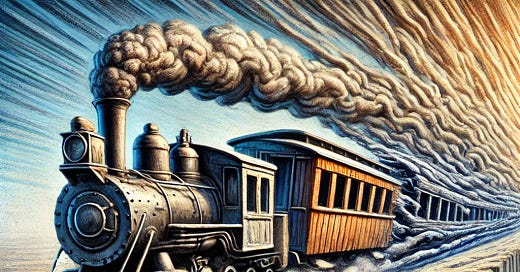Ever get the feeling that technological change is hard to keep up with?
By the time you’ve gotten used to this new thing, that other new thing has already replaced it, and the public is nearly ready to move on past that new thing. Meanwhile, our society is still scrambling to get used to the first new thing.
You are not alone, and this phenomenon has been given a catchy name: cultural lag. Writing about a hundred years ago, sociologist William Ogburn theorized that, for most of human history, technology has driven social change, with plenty of time (human generations) passing between each new major paradigm.
Ogburn’s Social Change with Respect to Culture and Original Nature, published in 1922, called attention to how the industrial revolution was changing everything. No longer were there generations between paradigms where children could grow up learning this new way of life before passing it down to their own children.
Now, life-altering changes to society were rising and falling faster than society could keep up. Ogburn’s framework divided the world of culture into two realms for the purposes of his theory. There was material culture, consisting of tools and technology, along with everything we’ve built with those tools. And, by contrast, there was non-material culture.
This second category included all the intangible things like our deepest beliefs as a society. Do we use the scientific method? Do we believe in being kind to our neighbors? It also includes social norms like respecting personal space or whether women have the same rights as men.
Throughout most of our existence, we’ve had enough time to adjust to these changes, so the material culture drove the non-material culture forward, a bit like a train’s engine pulling another car along behind it. In other words, our non-material culture was (mostly) able to keep up with our material culture.
Ogburn points out that the industrial revolution changed the nature of that relationship. No longer was there a neat connection between the two, but instead a lag began to form. People were just starting to get used to newspapers being widely available, when the radio began to replace reading the evening news.
By the time folks had begun to get used to the idea of a radio being in the home, it was time to start thinking about television. By the time folks got used to the reliable and affordable nature of rail travel, automobiles were introduced. By the time folks had started being used to driving, they had to deal with traffic congestion and a very different type of city.
So it went for the entire 20th century, with the pace of innovation increasing every decade, and with society scrambling to keep up. There are several necessary conditions that led to both world wars, and I think this massive cultural lag was one of them.
My own lifetime has seen this pace continue to increase, with predictable results as we humans try to figure out how to make our non-material culture and our material culture match up.
I got to see the clumsy (and quick) climb up from typewriters to electronic keyboards, where you could erase an entire word with a button, like a mechanical paintbrush going over the letters you didn’t want to type. I invested time in learning how to print, save, and edit from these devices, and then they just kind of went away.
It’s almost as though people just barely got used to computer keyboards before smartphones began to replace them, and now a great deal of “typing” is done by talking, by using voice-to-text. One can imagine a next paradigm where Cerebro just jumps right in there and grabs your thoughts.
Learning to type on a new device is one thing, but these are communication paradigms as well as thinking machines. Each time there’s a more efficient way to communicate, it can be rolled out long before everyone is accustomed to the previous way of doing business.
In the developing world, there’s even leapfrogging—skipping over an entire generation of technology. Other nations went through a phase where they had time to adjust to some in-between paradigm, but many nations are skipping the step of putting in phone lines in favor of simply using cellular devices.
Moving fast and leaving things behind, it seems, is inevitable when there’s this big of a cultural lag. We’re starting to see some eyebrow-raisers like AI companions and self-driving cars, where people are going to be scrambling to keep up the entire time, right until the next hot thing comes along.
Are we headed toward a future where society is just broken and doesn’t work, or can we create something new together to address these changes? That seems to be one of the most important questions to answer right now.
What are the most notable examples of cultural lag you’ve noticed during your own lifetime?






I'll apply this to the media I mainly study as a historian. Cable TV increased the capacity for the production of television, but the advent of streaming services has led largely to the sort of creative straightjacketing TV endured in the network era. Meanwhile, recordings of music seem now to be second-class citizens in the biased eyes of the media in comparison to music streaming- where, even if the company itself is profitable, the actual musicians are not profiting.
We're living through a pretty massive cultural lag with AI right now. As Ethan Mollick constantly emphasizes, even if all AI progress abruptly stopped today, we have at least a decade's worth of societal change baked into the current models - it'll take a long time for all potential benefits to trickle down and get incorporated into products we use daily and you have the impact we might expect.
And that's if all progress stops entirely, which, as we've seen, is the opposite of what's happening so far.